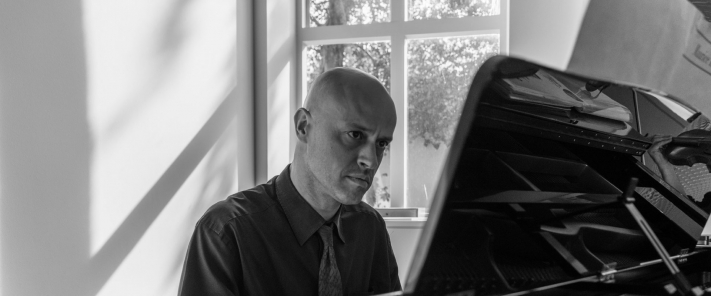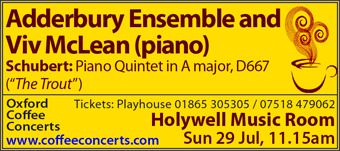Franz Schubert was on his holidays in the Austrian town of Steyr, mid-way between Salzburg and Vienna, when he composed his Piano Quintet in A ('The Trout') in July 1819. Just 199 years later, many of Sunday's Coffee Concert audience were similarly on vacation – my neighbours had come respectively from Los Angeles and Aberdeen - though it's doubtful whether their exploration of the county extended to the Windrush at Burford, the trout stream nearest to Oxford, as had Schubert's of the trout waters near Steyr.
'The Trout' pops up fairly regularly in these Coffee Concert programmes, not surprising given its quality and popular status in the chamber music canon. I last heard these Adderbury players with Viv McLean tackle it in 2015, though its most recent hearing on Holywell St was, I think, last September from the Isimsiz trio with Mathis Rochat (viola) and Marco Behtash (double bass). That was a strings-heavy, ponderous rendering, alas, conjuring up little sense of rustic, riparian sunlight. Now Viv McLean gave us a couple of Schubert's best-known Impromptus as an hors d'oeuvre: the G flat (No. 3) and its companion the A flat (No. 4). Appearing from the musicians' side door, he sat pondering on his stool for a moment, carefully swept imaginary dust from the keyboard and launched himself into these two black-key pieces; leggiero and silvery except in their darker, heavier middle moments. He contrasted lyricism with drama and portent, all in an unobtrusive, smooth way.
The first of the pair requires a constant, rippling effect from the right hand, and the tone is consistently reflective, with little variation, whereas the A flat produces a raindrop effect, chiming perfectly with the interruption of a wet morning in this tropical summer and specifically with the bedraggled egg yolk flowers of the Fremontodendron climber brushing against the panes of the Music Room's furthest NE window, perhaps wishing to obtain succour from the sparkling music indoors. In this case, the rhythm springs more conventionally from the left hand, a pretty inversion from its earlier companion.
The four Adderbury strings players now joined our pianist, all in black save for cellist Jane Fenton's spangly maroon shirt. In the opening 'allegro vivace' the initial chord was followed by seven rising notes which set the musical argument flowing unerringly in a performance fast on its feet without ever feeling rushed. Twice the music builds with mounting tension to a little, heightened climax only to be released almost as soon as initiated – this is holiday music, after all. At those moments double bassist Jub Davis was almost casting his instrument away from him in the the rhythmical body movement of a fly fisherman seeking its elusive prey.
The rather more troubled 'Andante' is reminiscent of Mozart in respect of Schubert's ability to switch on a sixpence from the major into the minor key and then back again, but our quintet combined the necessary melancholy with a typically Schubertian grace of phrase. The halfway point is marked by a clear pause before the music begins again. This effect is described by Mike Wheeler in his programme notes, impossible to improve upon: 'The effect is like watching a character leave from one side of the stage, only to re-appear instantly on the opposite one in a different costume'.
After the brief 'scherzo', the fourth movement is that which gives to the Quintet its nickname and supplies its backbone, and here was played with a bit of attack. The leading part was taken first by the strings, then passed to the piano, and then in the third variation the partnership becoms an equal one. Here Viv McLean's way of watching his colleagues very closely as he plays – strangely, a less common habit of chamber pianists than one might imagine – paid dividends in their easy fluency, with pretty elaboration of the theme in the form of little falling arpeggios from violinist John Mills.
The fourth movement contains a short passage where the volume increases. Here Jub's bass came to the fore and a fleeting hint of winter gales intrudes – perhaps a reference to Schubert's appreciation that a merry brook can turn into something of a raging torrent following prolonged rainfall; even to his understanding that nothing remains the same forever in this life.





